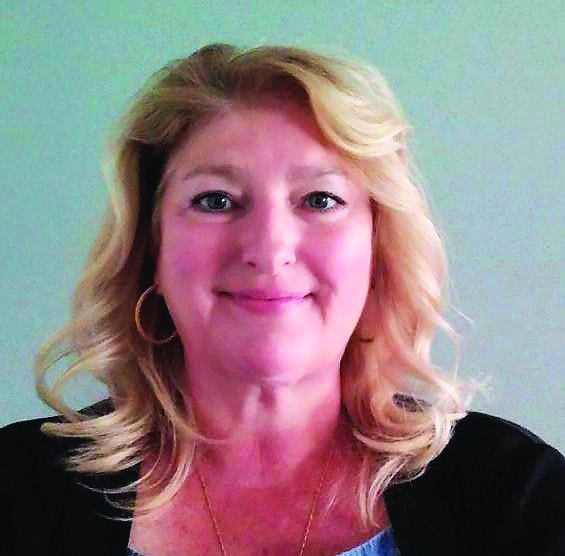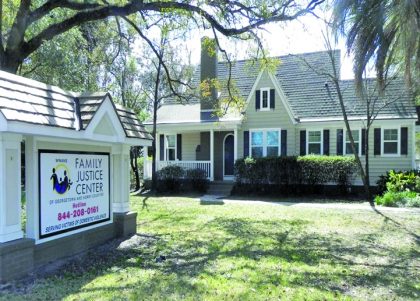
Subscribe to our newsletter
Enter your email address below and subscribe to our newsletter

As a tourist destination, our community is filled with fun times and beautiful beaches. Visitors come back year after year – and many choose to move here permanently. But what about the people who, despite their pleasant surroundings, must endure days filled with fear, pain and quiet despair? The Family Justice Center, led by Kim Parsons, Executive Director, is a domestic violence agency that serves Horry and Georgetown County, helping victims of domestic violence break free of their abusers and start new lives.
“I had never worked for an agency that dealt specifically with victims of domestic violence,” Kim told me as we began talking about her life and work. “I am a licensed professional counselor (LPC), and started work with the Family Justice Center (FJC), as a therapist working directly with clients.” Kim went on to tell me that the people the agency serves are not bad people; they’re just stuck in horrible relationships. “Abuse is not defined by race or socio-economic level, it’s across the board – it doesn’t matter who you are or where you are from. Some days this work is frustrating and stressful, but it is worth it to see people move on to a better life.”
Originally from West Virginia, Kim lived in Mt. Pleasant, South Carolina, for seven years. She and her husband settled in Myrtle Beach after they bought a garden center, Parson’s Garden Center, on Hwy 707. After moving to Myrtle Beach, Kim began working as a counselor, “I first worked for the Waccamaw Center for Mental Health, and then moved to Justice Works Behavioral Care where I was the Regional Supervisor for Horry and Florence Counties.”
In 2017, Kim came on board with FJC as a counselor, and soon was made Program Director at the Horry County office. “When Vicki Bourus decided she was going to retire, she began mentoring me to replace her, and last year I took over as Executive Director.” The agency has grown from three to 20 staff members in its seven years of operation, and the need continues to grow as our population rises.
“We offer services to victims of domestic violence in Horry and Georgetown Counties,” Kim said when I asked her to tell me more about the agency. “We offer court advocacy – helping people navigate the legal system, get orders of protection, and prepare to go into the courtroom, which is a daunting and scary process and why some people won’t go through with prosecuting their abuser.” FJC also offers emergency housing, counseling for adults and children, support groups, parenting classes and more. “All of our counselors are LPCs,” Kim added.
After helping a client get out of a dangerous situation, the next piece is case management. “That’s where we can offer the most help accessing resources,” Kim told me as she led me through what women go through just to get out of a situation no one should have to endure. “Housing is the biggest need in both counties, and we work closely with housing authorities and local landlords.” Clients are taught to budget money, how to get their children in a new school or daycare, how to apply for and keep a job – all of the things it takes to start over. “Case managers do a lot of the footwork,” said Kim. “When there is so much chaos going on around you, it’s nice to have support and someone to hold your hand through these steps.”
 All of this requires funding, as clients do not pay for services, and as a 501 (c)(3) non-profit, FJC depends on grants and fundraisers to support their mission. “We are working on a grant with Eastern Carolina Homelessness Organization (ECHO), and a HUD grant helps us offer transitional housing. There is also a rapid re-housing program that helps our clients pay security deposits, first and last month’s rent and utility deposits.” Kim told me that the agency helped 23 families last year with transitional housing and 24 families with rapid re-housing.
All of this requires funding, as clients do not pay for services, and as a 501 (c)(3) non-profit, FJC depends on grants and fundraisers to support their mission. “We are working on a grant with Eastern Carolina Homelessness Organization (ECHO), and a HUD grant helps us offer transitional housing. There is also a rapid re-housing program that helps our clients pay security deposits, first and last month’s rent and utility deposits.” Kim told me that the agency helped 23 families last year with transitional housing and 24 families with rapid re-housing.
The Taste of Georgetown is FJC’s largest fundraiser and is usually held the first Saturday of November. “We participated in Georgetown County’s Palmetto Giving Day this year and did very well,” Kim told me, even though the fundraiser was done virtually due to COVID-19. “It really demonstrates the support all the non-profits have in Georgetown County.” The organization’s other fundraisers, an oyster roast, a small music festival and others, are probably going to be rescheduled in 2021. Like most, if not all, nonprofits, FJC depends heavily on volunteer hours. “We have opportunities for volunteers who wish to help! We had 4,755 hours of service last year.”
“Our safe house in Georgetown is for clients who are fleeing and in imminent danger. They can go there and be safe while we’re helping them with other services, eventually moving into independent living.” Kim said FJC had 1200 shelter nights last year. “In Horry County, we will sometimes put clients in hotels as an emergency measure, but we are working to raise funds for a second shelter – it is desperately needed as 65% of our clients live in Horry County.”
Partnerships with other agencies are an important component in helping fill client’s needs. “We work with St. Francis Animal Center in Georgetown, All4Paws in Pawleys Island, and Grand Strand Humane Society in Myrtle Beach. People’s pets are a big deal. Sometimes people won’t leave if they can’t take their pets.” Kim shared that FJC is hoping to build a component of their shelter that will house pets. Currently, clients are allowed to bring service animals.
“Sometimes we buy bus or plane tickets and help people flee the area, back to their friends and family,” Kim continued. “And we’ve paid for people’s pets to fly with them. It’s not just how we can help within the four walls of our building; it’s how we can help you get to where you want to be.”
“I can’t say enough positive things about what we do,” Kim said as we finished our chat. “It’s nice at the end of the day to look back and see that the little things we do make a big difference in people’s lives. Our clients leave us on a positive life path and their children are no longer living in a toxic and scary environment.” Kim sees the biggest change in the children as they begin to let go of the fear. “In the shelter, kids are totally different at the end of 60-90 days. They blossom. That’s something a counselor doesn’t usually get to see – and I know we’re making a difference. Vicki created a great agency, with a wonderful staff and dedicated volunteers. I am honored to be here.”
If you or someone you know is being victimized by domestic violence, call the Family Justice Center’s Crisis Hotline at 844-208-0161. These phone lines are manned 24/7 by trained staff members. There is help available.
Visit www.fjcgtowhorry.com for more information.